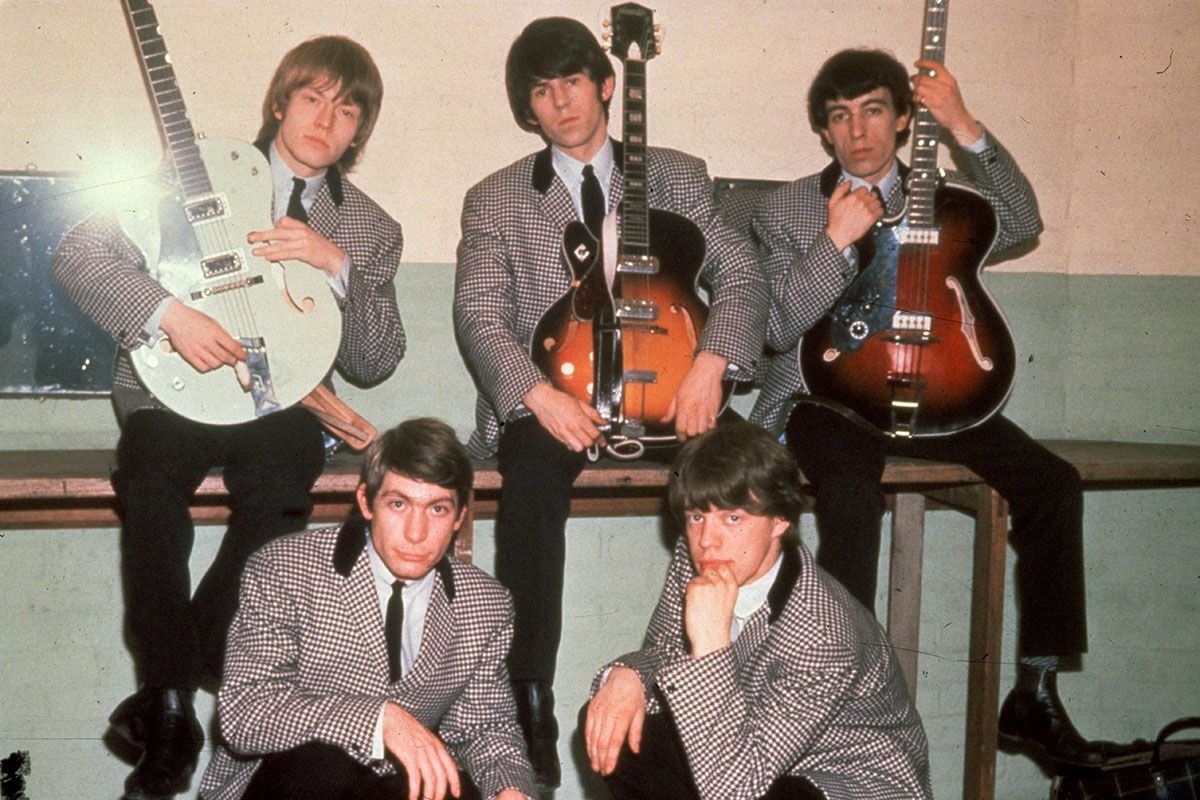Rolling Stones News
Top 10 Iconic Rolling Stones Songs That Defined Rock Music
The Rolling Stones are undoubtedly one of the most influential and iconic rock bands of all time. Formed in 1962 in London, England, the band has left an indelible mark on the music industry, with their blues-infused rock sound and captivating stage presence. Over the course of their career, The Rolling Stones have amassed a vast repertoire of classic songs that have become the soundtrack to generations of music fans.
In this comprehensive article, we will explore the top 10 most iconic Rolling Stones songs that have defined rock music. From their early hits that cemented their status as the “World’s Greatest Rock and Roll Band” to their later works that showcased their musical evolution, each of these songs has left an indelible mark on the music landscape.
Introducing The Rolling Stones and Their Impact on Rock Music History

The Rolling Stones, often referred to as the “World’s Greatest Rock and Roll Band,” have been a force to be reckoned with in the music industry for over six decades. Formed in 1962 by Mick Jagger, Keith Richards, Brian Jones, Bill Wyman, and Charlie Watts, the band’s initial lineup has undergone several changes over the years, with Jagger and Richards remaining the core members.
From the outset, The Rolling Stones were heavily influenced by American blues and rhythm and blues artists, such as Muddy Waters, Howlin’ Wolf, and Chuck Berry. This infusion of blues-based rock, combined with their raw, energetic live performances, quickly set them apart from their contemporaries and established them as one of the most prominent figures in the burgeoning British Invasion movement of the 1960s.
As the band’s popularity grew, so did their influence on popular culture. The Rolling Stones songs were at the forefront of the counterculture revolution, with their rebellious image and socially conscious lyrics resonating with the youth of the era. Their music, fashion, and stage presence became synonymous with the rebellious spirit of the 1960s and 1970s, and their impact can still be felt in the music of today.
The Rolling Stones’ Iconic Discography
Over the course of their illustrious career, The Rolling Stones have released 30 studio albums, numerous live recordings, and countless singles, cementing their status as one of the most prolific and influential bands in rock history. From their debut album, “The Rolling Stones” (1964), to their most recent release, “Blue & Lonesome” (2016), the band has consistently delivered a diverse range of music, showcasing their versatility and their ability to adapt to changing trends and genres.
The Band’s Enduring Legacy
The Rolling Stones’ impact on the music industry cannot be overstated. Their influence can be seen in the work of countless artists, from the punk rock movement of the 1970s to the modern alternative rock scene. Their iconic status has also transcended the boundaries of music, with their image and style becoming a cultural touchstone that continues to inspire fashion, art, and popular culture.
As the band members have aged, their music has only grown in significance, with their classic hits continuing to resonate with audiences around the world. The Rolling Stones’ legacy is one of enduring artistry, innovation, and a relentless pursuit of musical excellence, cementing their place as true icons of rock music.

1. “(I Can’t Get No) Satisfaction” – The Band’s Breakout Hit and Cultural Anthem
“(I Can’t Get No) Satisfaction” is undoubtedly one of the most iconic and recognizable songs in The Rolling Stones’ extensive catalog. Released in 1965, the song quickly became a global hit, reaching the top of the charts in the United States and establishing the band as a major force in the music industry.
The Birth of a Classic
The origins of “(I Can’t Get No) Satisfaction” can be traced back to a guitar riff that Keith Richards allegedly came up with in his sleep. Inspired by the repetitive nature of the riff, Jagger and Richards set out to craft a song that captured the frustration and disillusionment of modern life.
The lyrics of the song explore themes of consumerism, sexual dissatisfaction, and the inability to find true fulfillment in a world that constantly demands more. The iconic chorus, with its repeated refrain of “I can’t get no satisfaction,” has become a cultural touchstone, resonating with audiences across generations.
The Impact of “(I Can’t Get No) Satisfaction”
The release of “(I Can’t Get No) Satisfaction” marked a significant turning point in The Rolling Stones’ career. The song’s raw, blues-infused sound and provocative lyrics cemented the band’s reputation as the “bad boys” of rock, setting them apart from their more polished contemporaries.
The song’s impact on popular culture cannot be overstated. “(I Can’t Get No) Satisfaction” has been covered by countless artists, featured in numerous films and television shows, and has become an enduring symbol of the rebellious spirit of the 1960s. The song’s influence can still be felt in the music and attitudes of contemporary rock acts, serving as a testament to its enduring cultural significance.
2. “Paint It, Black” – The Unique Blend of Rock and Eastern Instrumentation
“Paint It, Black,” released in 1966, is a testament to The Rolling Stones’ musical versatility and their willingness to experiment with different sounds and styles. The song’s haunting, minor-key melody and the incorporation of Eastern-inspired instrumentation set it apart from the band’s earlier, more blues-oriented material.
Analyzing the Music and Lyrics
The foundation of “Paint It, Black” is a driving, riff-based guitar part, with the addition of a sitar and tamboura adding a distinct Eastern flavor to the overall sound. Lyrically, the song explores themes of death, despair, and the desire to escape the realities of the world, with Jagger’s anguished vocals adding to the song’s somber and introspective tone.
The song’s unique blend of rock and Eastern instrumentation was a groundbreaking move at the time, reflecting the band’s growing interest in incorporating non-Western influences into their music. This experimentation with different musical styles and textures would become a hallmark of The Rolling Stones’ artistic evolution, setting the stage for more adventurous and diverse musical explorations in the years to come.
The Cultural Impact of “Paint It, Black”
“Paint It, Black” quickly became a staple of The Rolling Stones’ live performances, and its influence on popular culture is undeniable. The song has been featured in numerous films, television shows, and commercials, cementing its status as one of the band’s most iconic and enduring works.
Beyond its cultural impact, “Paint It, Black” also played a significant role in shaping the development of psychedelic rock and other experimental genres. The song’s use of Eastern instrumentation and its dark, introspective tone were echoed in the work of numerous artists who sought to push the boundaries of rock music during the late 1960s and early 1970s.

3. “Sympathy for the Devil” – A Controversial and Powerful Masterpiece
“Sympathy for the Devil,” released in 1968, is a song that has long been regarded as one of The Rolling Stones’ most ambitious and controversial works. The song’s lyrical exploration of the nature of evil and the role of the individual in the face of global atrocities has sparked intense debate and analysis over the decades.
The Origins and Inspiration Behind the Song
The origins of “Sympathy for the Devil” can be traced back to Mick Jagger’s fascination with the figure of the devil and the concept of evil. Inspired by the Russian novel “The Master and Margarita” by Mikhail Bulgakov, Jagger crafted a lyrical narrative that personified the devil as a witness to some of the most significant events in human history, from the Reign of Terror during the French Revolution to the assassination of the Romanov family.
The song’s unique blend of blues, rock, and Latin-inspired rhythms, coupled with its provocative lyrics, created a powerful and unsettling listening experience that challenged listeners to confront the darker aspects of human nature.
Public Reaction and Critical Reception
The release of “Sympathy for the Devil” was met with a mixed response from the public and music critics. Some listeners found the song’s subject matter and imagery to be deeply disturbing, while others praised its artistic merit and the band’s willingness to tackle such weighty and controversial themes.
The song’s association with the Altamont Free Concert, a disastrous event that saw the death of a concertgoer at the hands of the Hells Angels, further fueled the controversy surrounding the song. Despite this, “Sympathy for the Devil” has endured as one of The Rolling Stones’ most acclaimed and influential works, with its impact felt across various artistic disciplines, from literature to film.
4. “Gimme Shelter” – A Powerful Rock Ballad About War and Violence
“Gimme Shelter,” released in 1969, is a stark and powerful rock ballad that captures the tumultuous and uncertain atmosphere of the late 1960s. The song’s haunting melody, coupled with Mick Jagger’s anguished vocals and the inclusion of Merry Clayton’s powerful backing vocals, create a sense of unease and tension that resonates with listeners to this day.
The Historical Context of “Gimme Shelter”
The release of “Gimme Shelter” came during a particularly turbulent time in American history, with the Vietnam War raging and civil unrest and violence becoming increasingly prominent in the public consciousness. The song’s lyrics, which explore themes of war, violence, and the need for refuge, spoke directly to the anxieties and fears of a generation grappling with the realities of a world in upheaval.
Analyzing the Musical Elements
The musical elements of “Gimme Shelter” are equally powerful and influential. The song’s opening guitar riff, played by Ry Cooder, sets the tone for the track, with its ominous, minor-key progression creating a sense of foreboding. The addition of the searing electric guitar solo and the powerful rhythm section, combined with Jagger’s emotive vocals and the haunting backing vocals of Merry Clayton, elevate the song to a true masterpiece of rock music.
The inclusion of the female backing vocals, which were recorded separately and then layered into the track, was a groundbreaking move at the time, adding a sense of urgency and desperation to the song’s overall sound. This innovative approach to vocal arrangements would go on to influence countless artists in the years to come.
5. “Angie” – A Timeless Rock Ballad

“Angie,” released in 1973, is a poignant and introspective ballad that showcases The Rolling Stones’ ability to create deeply emotive and introspective music. The song’s gentle, acoustic-driven melody and Jagger’s vulnerable vocal performance have made it a beloved classic among Stones fans and casual listeners alike.
The Story Behind the Song
The origins of “Angie” can be traced back to a personal experience in Keith Richards’ life. Reportedly, the song was inspired by the end of his relationship with Anita Pallenberg, the mother of his three children. The lyrics, which explore themes of heartbreak, loss, and the bittersweet nature of love, are a testament to the band’s ability to craft songs that resonate on a deeply personal level.
The Song’s Commercial Success and Cultural Impact
“Angie” became an instant success upon its release, reaching the top of the charts in numerous countries and cementing its status as one of The Rolling Stones’ most popular and enduring ballads. The song’s timeless appeal has ensured its continued relevance and popularity, with numerous artists covering the track over the years.
Beyond its commercial success, “Angie” has also had a significant impact on popular culture. The song has been featured in numerous films and television shows, serving as a backdrop to moments of emotional significance and resonating with audiences across generations. The song’s status as a rock ballad classic has also ensured its enduring legacy, with its influence felt in the work of countless subsequent artists.
6. “Start Me Up” – A High-Energy Rock Anthem of the 1980s
“Start Me Up,” released in 1981, is a quintessential Rolling Stones rock anthem that epitomizes the band’s ability to adapt and evolve their sound to suit the musical landscape of the time. The song’s infectious, uptempo groove and Jagger’s energetic vocal performance have made it a staple of the band’s live shows and a beloved classic among fans.
The Creation and Recording of “Start Me Up”
The origins of “Start Me Up” can be traced back to the early 1970s, when the band first started working on the song during the sessions for their 1978 album, “Some Girls.” However, it wasn’t until the early 1980s that the band finally completed the track, with producer Chris Kimsey helping to shape the song’s polished, arena-ready sound.
The final version of “Start Me Up” featured a driving, guitar-based riff that became the backbone of the track, complemented by the band’s signature rock sound and Jagger’s charismatic vocals. The song’s production values, which reflected the high-gloss aesthetic of 1980s rock, helped to establish the track as a quintessential anthem of the era.
The Song’s Impact on The Rolling Stones’ Career
The release of “Start Me Up” marked a significant turning point in The Rolling Stones’ career, as the band sought to adapt to the changing musical landscape of the 1980s. The song’s commercial success, which saw it reach the top 5 on the Billboard Hot 100, helped to cement the band’s status as one of the most enduring and influential acts in rock music.
Beyond its commercial impact, “Start Me Up” also played a crucial role in shaping the band’s live performances during the 1980s and beyond. The song’s high-energy, crowd-pleasing nature made it a staple of the Stones’ live shows, with the band often using it to open their concerts and set the tone for the evening’s festivities.

7. “Brown Sugar” – A Controversial Hit with an Infectious Groove
“Brown Sugar,” released in 1971, is a quintessential Rolling Stones song that showcases the band’s ability to blend blues, rock, and R&B into a highly infectious and memorable track. However, the song’s controversial lyrics, which touch on themes of slavery and sexual exploitation, have long been a source of debate and discussion among fans and critics alike.
Exploring the Lyrical Controversy
The lyrics of “Brown Sugar” have been the subject of intense scrutiny and criticism over the years, with many listeners finding the song’s references to the exploitation of enslaved people and the sexualization of young women to be deeply problematic. Mick Jagger, the song’s primary lyricist, has acknowledged the controversial nature of the lyrics, stating that they were not intended to be taken literally but rather as a reflection of the complex and often disturbing realities of the time.
Despite the ongoing debate surrounding the song’s lyrics, “Brown Sugar” remains a beloved and iconic Rolling Stones track, with its infectious groove and memorable riff continuing to resonate with audiences around the world.
The Evolution of “Brown Sugar”
The story of “Brown Sugar” does not end with its initial release, as the song has undergone various transformations and reinterpretations over the decades. The band has often experimented with the song’s arrangement and instrumentation during live performances, keeping the track fresh and engaging for their audiences.
Moreover, the song’s enduring popularity has led to numerous cover versions and reinterpretations by other artists, further solidifying its status as a true rock music classic. The ability of “Brown Sugar” to withstand the test of time and continue to captivate new generations of listeners is a testament to the enduring power of The Rolling Stones’ music.
Read more: 10 Best Rolling Stones Albums: A Journey Through Rock and Roll History

8. “Honky Tonk Women” – A Blend of Rock and Country
“Honky Tonk Women,” released in 1969, is a quintessential Rolling Stones song that showcases the band’s ability to seamlessly blend rock and country music. The song’s driving rhythm, Jagger’s gritty vocal performance, and the incorporation of country-inspired instrumentation, such as the slide guitar, have made it one of the band’s most iconic and enduring tracks.
The Origins and Inspiration Behind “Honky Tonk Women”
The inspiration for “Honky Tonk Women” can be traced back to the band’s experiences during their 1969 tour of South America, where they encountered a variety of local musical styles and influences. Intrigued by the rhythmic and melodic elements of these regional sounds, the band sought to incorporate them into their own music, giving birth to the unique blend of rock and country that defines “Honky Tonk Women.”
The song’s lyrical content, which focuses on the exploits of a “honky tonk woman” and the narrator’s desire to be with her, further reinforces the track’s connection to the country and blues traditions that had long been a cornerstone of the Rolling Stones’ sound.
The Various Versions and Interpretations of “Honky Tonk Women”
Over the years, “Honky Tonk Women” has been the subject of numerous interpretations and variations, with the band often experimenting with the song’s arrangement and instrumentation during live performances. The song has also been covered by a wide range of artists, further solidifying its status as a timeless classic in the rock music canon.
One of the most notable reinterpretations of “Honky Tonk Women” came in 1971 when the band released an acoustic version of the song, showcasing a more stripped-down and intimate take on the track. This reimagining highlighted the versatility and enduring appeal of the song, demonstrating its ability to resonate with audiences across different musical genres and styles.
Despite the passage of time, “Honky Tonk Women” remains a fan favorite at Rolling Stones concerts, with its infectious energy and catchy melody continuing to captivate audiences around the world. The song’s enduring popularity is a testament to the band’s ability to transcend musical boundaries and create timeless music that resonates with listeners of all ages.
9. “You Can’t Always Get What You Want” – A Song with Profound Meaning
“You Can’t Always Get What You Want,” released in 1969, is a poignant and introspective track that has become one of the Rolling Stones’ most enduring and beloved songs. With its heartfelt lyrics and soulful melody, the song explores themes of acceptance, resilience, and the complexities of human desire, resonating with listeners on a deep and emotional level.
Analyzing the Lyrics and Meaning of “You Can’t Always Get What You Want”
The lyrics of “You Can’t Always Get What You Want” offer a powerful message of hope and acceptance, emphasizing the importance of embracing life’s challenges and uncertainties with grace and resilience. The song’s central refrain, “You can’t always get what you want, but if you try sometimes, you might find, you get what you need,” serves as a poignant reminder of the unpredictable nature of existence and the value of perseverance in the face of adversity.
Moreover, the song’s evocative imagery and vivid storytelling paint a rich and nuanced portrait of the human experience, capturing the universal struggles and triumphs that define the human condition. Mick Jagger’s soulful vocal delivery imbues the lyrics with a sense of raw emotion and vulnerability, further enhancing the song’s impact and resonance with audiences.
The Cultural and Political Significance of “You Can’t Always Get What You Want”
Beyond its personal and emotional themes, “You Can’t Always Get What You Want” has also taken on broader cultural and political significance over the years. The song’s message of resilience and acceptance has resonated with listeners during times of social upheaval and uncertainty, serving as a source of comfort and inspiration in the face of adversity.
Moreover, the song’s inclusion in various film soundtracks, television shows, and political events has further solidified its status as a cultural touchstone, underscoring its enduring relevance and impact across different mediums and contexts. Whether used as a rallying cry for social change or a source of solace in times of turmoil, “You Can’t Always Get What You Want” continues to hold a special place in the hearts of fans and critics alike.

10. “Wild Horses” – An Emotional Rock Ballad
“Wild Horses,” released in 1971, is a haunting and emotionally resonant ballad that showcases the Rolling Stones’ softer and more introspective side. With its tender lyrics, melancholic melody, and heartfelt vocal performance, the song has become a timeless classic and a fan favorite among audiences worldwide.
Unpacking the Story Behind “Wild Horses”
The origins of “Wild Horses” can be traced back to the band’s experiences during their 1969 tour of the United States, where they encountered the rugged beauty and untamed spirit of the American West. Inspired by these landscapes and the sense of freedom and adventure they evoked, Mick Jagger and Keith Richards set out to capture these emotions in a song that would ultimately become “Wild Horses.”
The song’s poignant lyrics, which speak of love, loss, and longing, reflect the band members’ personal experiences and emotions at the time, adding a layer of authenticity and depth to the track. Jagger’s soulful vocal delivery and Richards’ delicate guitar work further enhance the song’s emotional impact, creating a moving and unforgettable listening experience for fans.
Notable Cover Versions of “Wild Horses”
Over the years, “Wild Horses” has been covered by a wide range of artists from different musical genres, attesting to the song’s enduring popularity and universal appeal. One of the most famous cover versions of the track came in 2002 when the iconic British singer Susan Boyle delivered a stirring rendition of the song on the reality TV show “Britain’s Got Talent,” captivating audiences with her powerful vocals and emotional delivery.
Additionally, artists such as Alicia Keys, Sheryl Crow, and The Sundays have also put their own unique spin on “Wild Horses,” showcasing the song’s versatility and ability to resonate with listeners across different generations and musical tastes. These interpretations pay tribute to the timeless quality of the song and its ability to evoke deep emotions and connections with audiences around the world.
Key Considerations When Appreciating The Rolling Stones’ Music
When delving into the vast and diverse catalog of The Rolling Stones’ music, there are several key considerations to keep in mind to fully appreciate the band’s artistry and impact on the rock music landscape.
Understanding the Historical and Social Context
One of the essential aspects of appreciating The Rolling Stones’ music is understanding the historical and social context in which their songs were created. From the rebellious spirit of the 1960s counterculture to the excesses of the 1980s rock scene, the band’s music has always been deeply intertwined with the cultural and political currents of the time.
By exploring the social issues, musical trends, and artistic movements that shaped each era of the band’s career, listeners can gain a deeper appreciation for the thematic richness and complexity of The Rolling Stones’ music. Whether addressing topics such as love, rebellion, or social justice, the band’s songs serve as a mirror to the changing world around them, offering insights into the human experience and the power of music to provoke thought and inspire change.
Tracing the Evolution of Their Musical Style
Another important aspect to consider when exploring The Rolling Stones’ music is tracing the evolution of their musical style and sound over the decades. From their early blues and R&B roots to their forays into psychedelia, country, and disco, the band has continually pushed the boundaries of rock music and experimented with new genres and influences.
By examining the sonic textures, lyrical themes, and instrumental techniques present in each album and era of the band’s career, listeners can gain a deeper understanding of the band’s creative process and artistic vision. Whether reveling in the raw energy of their early recordings or savoring the polished production of their later albums, each phase of The Rolling Stones’ musical journey offers a unique and compelling insight into the band’s evolution as artists and performers.
Listen to great music by The Rolling Stones: https://www.youtube.com/watch?v=WyyoP5MBWFE&t=6s
Recognizing Their Influence on Future Generations
A crucial aspect of appreciating The Rolling Stones’ music is recognizing their profound influence on future generations of musicians and artists. From their pioneering use of studio techniques to their dynamic stage presence and iconic fashion sense, the band has left an indelible mark on the world of rock music and popular culture.
By exploring the ways in which contemporary artists have drawn inspiration from The Rolling Stones’ music, listeners can gain a greater appreciation for the band’s lasting legacy and enduring impact on the music industry. Whether through direct covers and tributes or more subtle nods and references, the band’s influence can be felt across a wide range of genres and styles, underscoring their status as true pioneers and innovators in the world of rock music.

Conclusion
In conclusion, The Rolling Stones stand as one of the most iconic and influential bands in the history of rock music, with a vast and diverse catalog of songs that have defined and shaped the musical landscape for over six decades. From their early hits like “(I Can’t Get No) Satisfaction” to their timeless classics such as “Paint It Black,” “Sympathy for the Devil,” and “Gimme Shelter,” the band has consistently pushed the boundaries of creativity and innovation, leaving an indelible mark on the world of music.
Through their electrifying live performances, groundbreaking studio recordings, and enduring cultural impact, The Rolling Stones have inspired countless artists and audiences around the world, cementing their status as true legends of rock and roll. By delving into the stories behind their most iconic songs, exploring their evolution as musicians and performers, and recognizing their lasting influence on future generations, listeners can gain a deeper appreciation for the band’s artistry and legacy.
As we continue to celebrate and cherish the music of The Rolling Stones, let us remember the band’s unparalleled contributions to the world of rock music and the enduring power of their songs to captivate, inspire, and move us. Long live The Rolling Stones, the undisputed kings of rock and roll!

